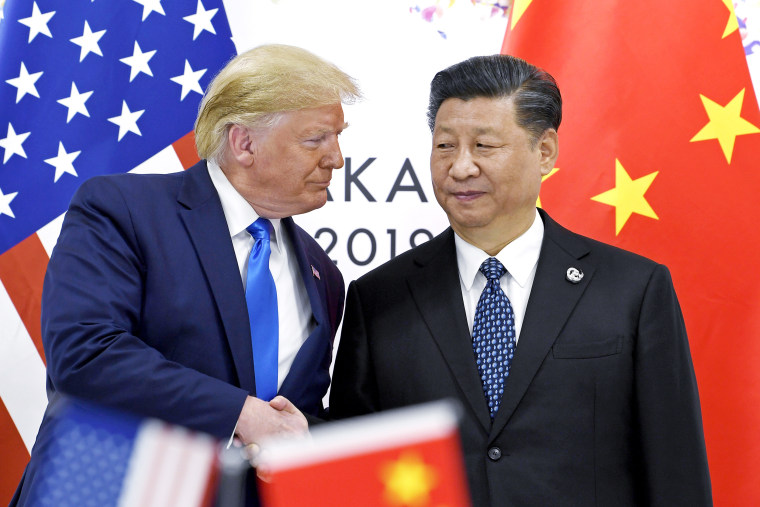The penguins have been offered some relief. The people of Switzerland, Laos and Syria, not so much.
This is the unlikely jumble of winners and losers of President Donald Trump’s finalized list of tariffs, which governments, markets and businesses across the globe were scrambling to make sense of Friday.
Some countries, such as Canada and South Africa, reacted with grave disappointment, warning that Trump’s executive order could prompt job losses globally and rising costs for Americans. For others, the damage was not as bad as expected, with some able to thrash out deals before his deadline, and others hopeful of striking one in the future.
The president had already drawn confusion and alarm when first unveiling his tariff list in April.
Many analysts questioned, for example, why he was imposing a 10% levy on Heard and McDonald — two Antarctic outposts populated solely by penguins — or slapping a colossal 50% rate on the impoverished southern African nation of Lesotho.

This week’s finalized list elicited reprieve but also dismay— often with little or no explanation.
The harshest import taxes were slapped on Syria (41%), Laos and Myanmar (40%), three relatively poor nations with, at best, modest trading relationships with Washington. And Iraq, Serbia (both 35%) and Algeria (30%) also found themselves subject to Trump’s executive pen.
(Brazil faces its own separate 50% tariff as punishment for what Trump says is a “witch hunt” against its former president and his right-wing ally, Jair Bolsonaro, who is accused of plotting a coup.)
Elsewhere Thursday, Lesotho’s 50% rate was slashed to 15% — but not before huge damage was already wrought. The initial tariff saw American buyers pausing orders, thousands of people losing their jobs and the government declaring a state of disaster.
Meanwhile the Heard and McDonald Islands and its flightless bird inhabitants dodged the tariff Trump threatened to impose on Australia, which owns the islands, and remained at the 10% rate first announced in April.
It is “hard to tell if there is any logic” to deciphering why some countries have been hit so hard while others were spared, said David Henig, a trade expert at the European Center for International Political Economy, a think tank based in Brussels.
Without a detailed explanation from the White House, Henig told NBC News, the calculations were most likely based on the previous formula Washington used that placed the biggest tariffs on the countries with the biggest trade surpluses.
In announcing the tariffs Thursday, Trump said these surpluses “constitute an unusual and extraordinary threat to the national security and economy of the United States.” (Many economists disagree that the U.S. trade deficit is inherently a bad thing, and his tariffs are the subject of an ongoing legal fight that is likely to end up at the Supreme Court.)
While the international uproar over Lesotho meant it was given a reprieve, other nations may have seen their tariffs maintained or even increased because “they weren’t the most obviously unfairly treated developing countries,” Henig said.
The White House did not immediately respond to a request for comment from NBC News on its rationale.
It’s not only developing or obscure places feeling the heat of Trump’s taxes.
Switzerland — one of the richest nations in terms of gross domestic product per capita — awoke Friday to find that it had been slapped with a colossal 39% rate, which its government noted with “great regret.”
This could spell trouble for Swiss chocolate and luxury watches, for which the U.S. is the largest market, with shares for Watches of Switzerland Group PLC tumbling 8.5% following the news Friday.
India also caught the eye as an American ally hit with a large 25% tariff but dismissed any suggestion of a rift, with Goods Ministry spokesman Randhir Jaiswal saying the world’s most populous nation was “confident that the relationship will continue to move forward.”
In Southeast Asia, meanwhile, where exports to the U.S. have been increasing as manufacturers shift production from China, the reaction was generally relief.
Thailand and Cambodia, which just agreed to a ceasefire after a five-day border conflict that killed more than 40 people, welcomed their 19% rate as “win-win” and “great news,” while Malaysia described its own rate as a “positive outcome.” Cambodia had been threatened with 49%.
The consistency creates a level playing field for Southeast Asian governments — with Indonesia and the Philippines on the same rate, and 20% for Vietnam — after they had worried Trump’s tariffs might favor some countries over others.
Taiwan, a tech hub that has a large trade surplus with the U.S., was hit with a 20% rate, lower than the 32% threatened in April but higher than the 15% negotiated by Japan, South Korea and the European Union. President Lai Ching-te said Friday that the 20% rate was “temporary” and that his government expected to negotiate a lower number.

Still up in the air are the final tariff rates between the U.S. and China, the world’s two largest economies, who rattled global markets this spring as they imposed spiraling tit-for-tat levies before both sides agreed to put most on pause until Aug. 12.
Treasury Secretary Scott Bessent said after meeting with Chinese trade officials this week that a potential extension of that pause could not be confirmed until Trump signed off on it.
“China’s position on tariffs is consistent and clear,” Foreign Ministry spokesman Guo Jiakun told a daily press briefing Friday. “There are no winners in tariff wars or trade wars.”
Alexander Smith reported from London and Jennifer Jett reported from Hong Kong.


